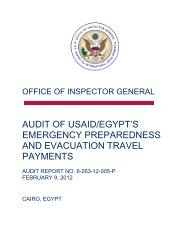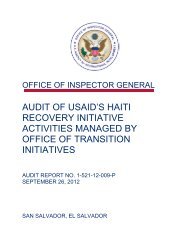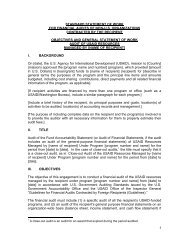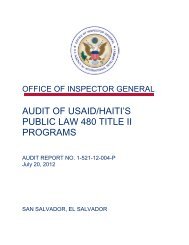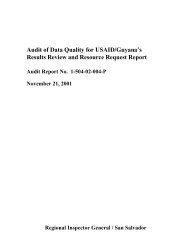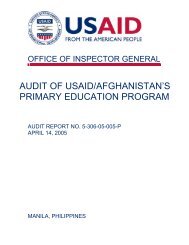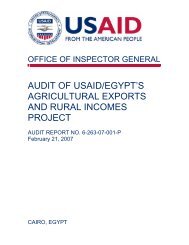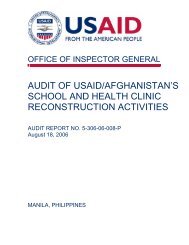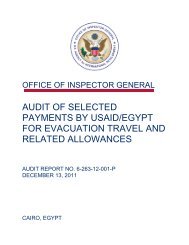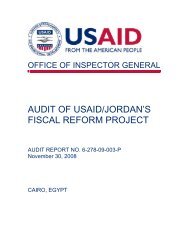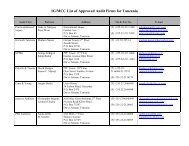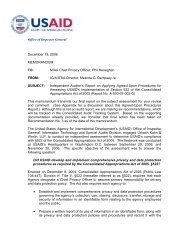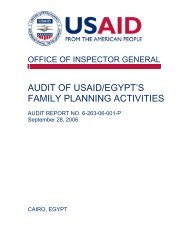USAID OIG Afghanistan and Pakistan Oversight Report, April-June ...
USAID OIG Afghanistan and Pakistan Oversight Report, April-June ...
USAID OIG Afghanistan and Pakistan Oversight Report, April-June ...
- No tags were found...
You also want an ePaper? Increase the reach of your titles
YUMPU automatically turns print PDFs into web optimized ePapers that Google loves.
farmers had not adopted these technologies for wider use, <strong>and</strong> NMSU placed relatively little emphasis onimproving distribution of irrigation water resources.NMSU’s efforts had not yet resulted in a more equitable, community-based system for managing irrigationwater. NMSU officials noted that the water-conserving technologies that they introduced could make morewater available for farmers at the tail of irrigation canals. For this to occur, however, the technologies mustbe widely adopted, <strong>and</strong> evidence of adoption of these technologies was lacking.Review of <strong>USAID</strong>/<strong>Afghanistan</strong>’s Ministerial Assessment Process (<strong>Report</strong> No. F-306-11-001-S,November 6, 2010)The U.S. Government planned to deliver 50 percent of its development aid to <strong>Afghanistan</strong> through thegovernment’s core budget by the end of calendar year 2011. With this expectation, <strong>USAID</strong>/<strong>Afghanistan</strong>conducted a series of preaward assessments of Afghan ministries to see whether they could responsiblymanage U.S. Government resources. A preaward assessment (sometimes called a preaward survey orpreaward audit) involves inquiries, observations, <strong>and</strong> tests to see whether the assessed entity has therequisite procedures, internal controls, experienced personnel, <strong>and</strong> other resources needed to manage U.S.Government funds responsibly.<strong>OIG</strong>’s review—which focused on assessments already performed by <strong>USAID</strong>/<strong>Afghanistan</strong>, as well as on draftscopes of work for future assessments—found that those conducted did not provide reasonable assurance ofdetecting significant vulnerabilities. The scope of the assessments varied from one ministry to another, butsome significant limitations existed. For example, reviewers did not know what programs the ministrieswould be asked to manage <strong>and</strong> could not therefore address the ministries’ capacity in these areas. Inaddition, none of the assessments explicitly considered the control environment in <strong>Afghanistan</strong> or inindividual ministries (e.g., the existence of widespread impunity or the ability of high-level officials tointerfere with law enforcement institutions <strong>and</strong> processes).<strong>OIG</strong> found a need for more testing to see whether internal control procedures were followed. In addition,more coverage of controls over fixed assets <strong>and</strong> payroll <strong>and</strong> attendance was required. Reviewers neededmore guidance on how to assess compliance with applicable laws <strong>and</strong> regulations, <strong>and</strong> more extensive<strong>USAID</strong> supervisory review of assessment reports was also required.Audit of <strong>USAID</strong>/<strong>Afghanistan</strong>’s Support to the American University of <strong>Afghanistan</strong> (<strong>Report</strong> No. 5-306-11-002-P, November 5, 2010)The Afghan Constitution <strong>and</strong> Civil Code, which took effect in July 2004, chartered the American University of<strong>Afghanistan</strong> to provide a high-quality education that meets international st<strong>and</strong>ards <strong>and</strong> emphasizes a liberalarts curriculum <strong>and</strong> higher education for the professions (e.g., offering courses in business English,information technology, leadership, <strong>and</strong> business management). The university began offeringundergraduate courses <strong>and</strong> professional programs in September 2006.To assist in the university’s development, <strong>USAID</strong>/<strong>Afghanistan</strong> entered into a $42 million cooperativeagreement with the university in August 2008, effective through July 2013.<strong>USAID</strong> <strong>OIG</strong> <strong>Afghanistan</strong> <strong>and</strong> <strong>Pakistan</strong> <strong>Oversight</strong> <strong>Report</strong> 77



